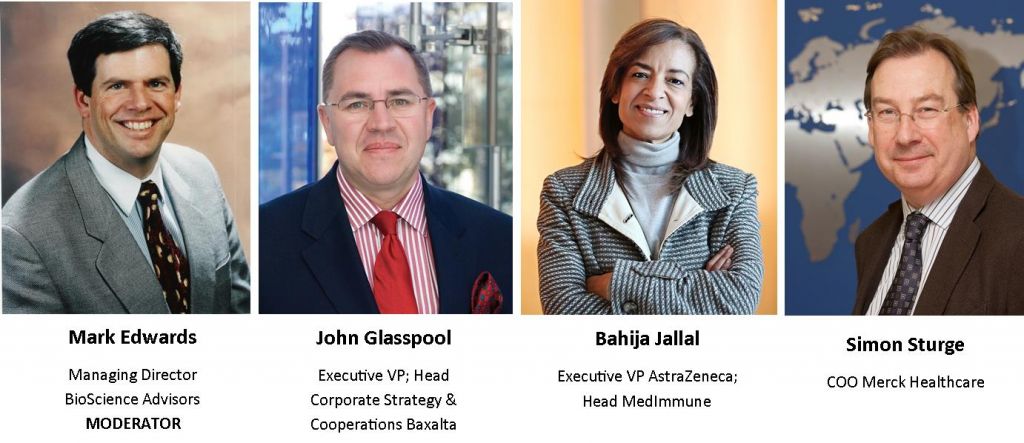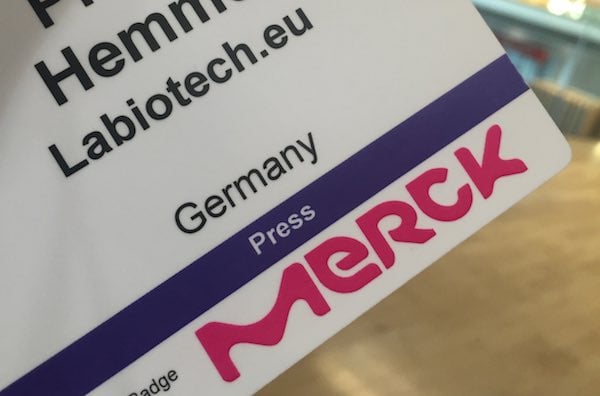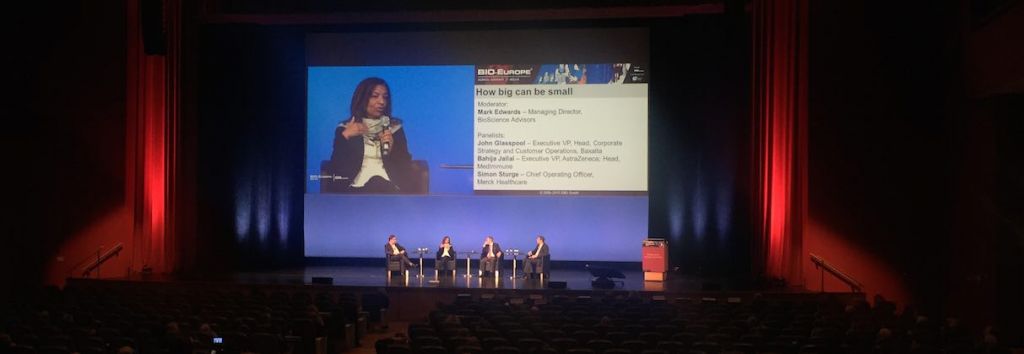As usual at BIO-Europe, the fair starts with an opening keynote, this time with speakers from Merck Healthcare, MedImmune/AstraZeneca and Baxalta.
The keynote is basically a discussion between high-level speakers, akin to the talk which took place in Paris during March, when Antoine Papiernik (the prominent European VC from Sofinnova) led a panel discussion with a few other CEOs.
This year, the panel had a pretty high level of Biotech clout again, even if the selection of speakers was more oriented towards Big Pharmas than Biotech. I’ll let you judge:

Edwards introduced the discussion :
“This will not be a panel discussion like the Republican ones, where none of the questions were answered“
That got me excited. I thought: Great! We will have a real discussion without formal or politically correct declarations. Unfortunately, it didn’t hold true to its promise, but the discussion was still interesting…
It started on how to build a culture of innovation inside your company. Jallal from MedImmune answered first.
Two components are crucial: the people and the environment you create for these people to be creative. Sturge continued on the important of the culture inside the company. “When you start to loose the culture of the company, it takes a long time to come back“. I wondered if he was talking about Merck‘s history…

The moderator then moved to whether there is a critical size to be innovative (or not to be anymore)?
Jallal had a very interesting view on that. To her, it’s almost the opposite case. When you have a small group of people left alone, it’s easy for them to really innovate. A bigger size and structure can then destroy the potential of innovating (akin to entropy I suppose – larger companies = too much structure).
She studied how you could scale this potential. Instead of looking at her own industry, Jallal looked at other industries such as Software. Most of the big companies in this field are still very innovative, despite their large size and the intense competition.
Why? They have a very strong vision (often driven by a strong founder still in place), and this vision is shared by every single person of the company. And by that she means for real, like really truly passionate…enamored even by their role within the company which is more than just having a job and a salary – but a ‘mission’ through which the company thrives. Plus, it sounds good.
To achieve that, these companies are extremely rigorous in the hiring.
Size is sometimes only a good excuse for not being innovative.”
MedImmune today amasses around 2500 employees, and is part of AstraZeneca. I guess she knows what she is talking about and she should face similar problems to a Merck or Baxter/Baxalta.
The conversation then moved to another topic: Immuno-oncology (of course). The moderator pointed out that in the three last years only, there was 36 deals worth over 6 billion dollars upfront. What is driving these deals?
Jallal’s answer was perfect:
“We are really in transformational time in oncology. I’ve been in Oncology for over 20 years and thought I would never see the true power of the immune system. People thought it would only happen in melanoma or immune diseases (i.e non-solid disease).
The turning point was in 2013 when positive data was presented at ASCO in non-small lung cancer (NSCLC). It showed that every single cancer can now be targeted by immuno-oncology. ”
She continued: “Amazing transformations are happening now and we are only scratching the surface“.
Sounds pretty clear.
She then recalled having met the first patient taking PD-L1 immune-therapies. The women was in terminal phase with melanoma in the brain and had basically no way to escape. She took the therapy and 3 years later, she completely recovered.
I don’t want to seem overly optimistic…but I am very optimistic.”
Another aspect of immuno-oncology is combination of different drugs. Glasspool from Baxalta was pretty clear: “that’s the way to go“. Cancer is so complex that one single strategy won’t be enough and that the ultimate treatment will certainly be out of several drugs.
CAR-T was mentioned as well. “It will need to combine with other drugs as well“, added Glasspool.
Sturge from Merck added that collaboration in biotech settings has never been so easy (perhaps in part due to events such as these). “The World is much smaller for collaboration“.
Many other topics were mentioned during the keynote including biomarkers, big data and IP. This is a summary of what I found the most interesting.
Personal comment: I realised I quoted a lot from Jallal. That’s just because I found her answers better than the other speakers. No particular affiliation to MedImmune or a French connection involved (although admittedly Jallal studied in Paris).





